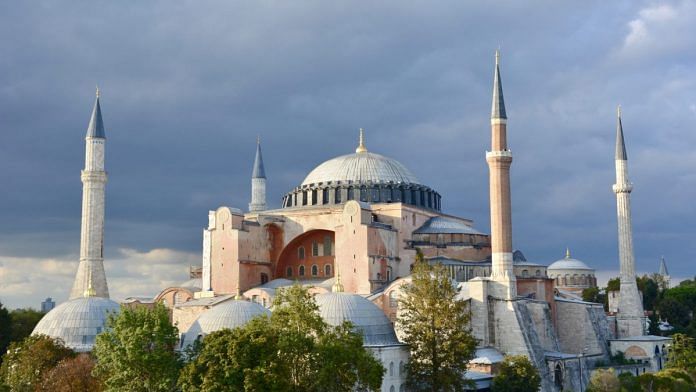Under normal circumstances, the most important news out of Turkey last weekend would have been a new law that, critics say, represents a blow to the country’s already weakened judicial system. But you might have missed it for the furor over President Recep Tayyip Erdogan’s decision to convert the famed Hagia Sophia museum, one of the world’s top tourist destinations, into a mosque.
Opposition figures such as Istanbul Mayor Ekrem Imamoglu say Erdogan is using the Hagia Sophia controversy to distract from missteps by his government, from the management of the economy to the handling of the coronavirus crisis. But the conversion is consistent with the president’s lifelong political goal: the reassertion of Turkey’s Muslim identity, and its corollary, the rejection of the secular nationalism of the country’s modern founder, Mustafa Kemal Ataturk.
Throughout his career, Erdogan has systematically chipped away at the secular foundations Ataturk laid in the 1920s and ‘30s, by encouraging overt expressions of religiosity in government as well as society. That he has done so while claiming to uphold Ataturk’s founding father legacy testifies to the latter’s outsized political footprint.
With the sacralizing of the Hagia Sophia, which had been secularized by Ataturk in 1934, the president can drop the pretense. The Turkish state is now an expression of Erdogan’s ideal more than it is Ataturk’s.
Secularism survives in Turkish society, but it is a fading force. Orhan Pamuk, the country’s preeminent literary figure, conceded as much when he told the BBC that the conversion of Hagia Sophia “is to say to the rest of the world, ‘Unfortunately we are not secular any more.’ There are millions of secular Turks like me who are crying against this, but their voices are not heard.”
Erdogan’s legacy will likely outlast that of Ataturk. For all the international outrage over the conversion of the museum into a mosque, it is hard to imagine a Turkish leader — and certainly not a democratically-elected one — turning the mosque back to a museum. Polls have shown most Turks favor the change, even though many recognize that it is politically expedient for the president.
The structural changes of the Erdogan era may be as hard to undo as the symbolic ones. Take the new law passed last weekend. It allows for the creation of new bar associations, potentially diluting the influence of the existing bodies: 78 out of 80 associations opposed the changes.
Critics note that Erdogan’s purges of the judicial system have already greatly weakened it. A European Commission report last summer pointed to “political pressure on judges and prosecutors and transfers of a large number of judges and prosecutors against their will.” It warned of “a negative impact on the independence and overall quality and efficiency of the judiciary.”
The bar associations are among the few remaining organizations able to speak truth to the president’s power, by drawing attention to abuses of authority. The fear is that new associations will be set up along political lines, with pro-government bodies balancing — or drowning out — independent ones.
International human-rights and legal groups have warned that the government “is seeking to, and may well succeed in, undermining the legal profession’s role to date in upholding human rights and the rule of law.”
That may not grab as much attention as Pope Francis’s statement about the Hagia Sophia, but the conversion of legal institutions says as much about the Turkey Erdogan has built as the re-purposing of a 6th century edifice.-Bloomberg
Also read: Turkish President Erdogan reconverts 16th century Hagia Sophia cathedral into a mosque




When world watched religious fanatic propagation unchecked from Spain to Asia, in such a situation no one has right to criticise Turkey. Its their inner issue as is declared of other nations.
Earlier the concept of secularism was emerged to accept and cheer everything in order to avoid conflicts on the name of faiths and principles but after reading your this billigerent article,I’m clear that you are also propagating your own ideology and don’t want to accept anything contrasting to what you guys believe to be right. But unlike to any other religious ideology your so called secularism is weak,imperfect and ideal to fulfill the world’s aspirations and needs and ultimately lead its believers to stress and depression.
Same Ayodhya politics of Turkey. Bigotry and regressive politics reigns everywhere. Speaks something of human nature.